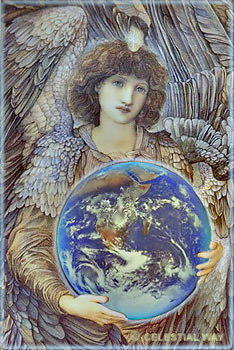| SPIRIT OF THE WORLD |
| MANY VOICES / ONE TRUTH |
| Gathered and organized and introduced by
JoAnn Kite
|
 |
| Take a few minutes to click through and explore this revealing masterpiece of visionary spiritual synopsis |
 |
THE MASKS OF GOD
Joseph Campbell
|
|
| 1 |
"Within a world that is itself divine, where God is immanent throughout, in the impulse of the flight of birds, the lightning, the falling rain, the fire in the sun, there is an epiphany of divinity in all sight, all thought, and all deeds."
|
|
| 2 |
"Platonic ideas are the structuring principles of all things, inherent in all, and to be recognized by the wakened mind."
|
|
| 3 |
"The mystery of the universe and the wonder of the temple of the world are what speak to us through all myths and rites – as well as the great effort of man to bring his individual life into concord with the whole."
|
|
| 4 |
"The [Egyptian] myths can no longer be taken simply in their literal sense. They have to be understood as a rendition of deeper thoughts, striving to comprehend the world spiritually, as a unit." Eduard Meyer
|
|
| 5 |
"All is God. Every stick and stone, person or power, that has ever been revered as a god, is indeed God; for God is all."
|
|
| 6 |
"Like a flower potential in its seed, the blossom of the realization of love is potential in every heart...and requires only proper cultivation to be fostered to maturity."
|
|
| 7 |
"The timelessness of eternity is reflected in the changing scene of time."
|
|
| 8 |
"The vocabulary of symbol is to such an extent constant through the world that it must be recognized to represent a single pictorial script, through which realizations of a tremendum experienced through life are given statement."
|
|
| 9 |
"Everything – absolutely everything – reveals the omnipresence of God as the ground of all being."
|
|
| 10 |
"The illusion of duality is the trick of maya. 'Thou art that' (tat tvam asi) is the proper thought for the first step to wisdom."
|
|
| 11 |
"Nothing can occur that is not – in the frame of the totality – absolutely good."
|
|
| 12 |
"Boundless Time holds everything in its tongs; shapes all things with its hammer; yet yields through its hard initiations knowledge of the adamantean reality, which is here and now, beyond the obscuring veil of duality, the true eternity of us all."
|
|
| 13 |
"Man in his native virtue is competent both to experience and to render blessedness."
|
|
| 14 |
"Mythological symbols touch and exhilarate centers of life beyond the reach of vocabularies of reason and coercion. The light-world modes of experience and thought were late, very late, developments in the biological prehistory of our species."
|
|
| 15 |
"The One that is all, forever remains: transcendent – beyond all; yet also immanent – within all."
|
|
| 16 |
"There is one God….He is all sight, all mind, all ear." Xenophanes of Colophon (fl. 536 bce)
|
|
| 17 |
"Divinity inheres in, as well as transcends, every particle of the universe and all its beings."
|
|
| 18 |
"Finally, all is found to be in some manner God – as in the words of the Gnostic Thomas Gospel, attributed to Jesus: 'I am the All, the All came forth from Me and the All attained to Me. Cleave the wood and I am there; lift up the stone, you will find me there.'"
|
|
| 19 |
"According to Posidonius of Alamea in Syria (ca. 135-50 bce), God is immanent throughout nature."
|
|
| 20 |
"God is in all things as being, as activity, as power." Meister Eckhart (1260-1327)
|
|
| 21 |
"The ever-living life in all lives appears to be many but is really one."
|
|
| 22 |
"Man is a cup, his soul the wine therein. Flesh is a pipe, spirit the voice within; O Khayyam, have you fathomed what man is? A magic lantern with a light therein." Omar Khayyam, Persian poet
|
|
| 23 |
"God is one not two. Who sees God sees nothing but one." Meister Eckhart (1260-1327)
|
|
| 24 |
"God is the simultaneous mutual implication of all things, even the contradictory ones." Nicholas Cusanus (1401-1464) 'Apologia doctae ignorantiae'
|
|
| 25 |
"The rites of Demeter and Persephone of Eleusis, Isis of Alexandria, Mithra of the Persians, and the Great Mother, Cybele, of Asia Minor, mutually influenced and enriched each other in the course of centuries – all in terms of a common ability to sense and experience the miracle of life itself as divine, and wonderfully so."
|
|
|
|
Randomize this reference |
New random category
Add a comment
Reference and bibliography |
All quotes, by category
We are gathering together the primary insights of spirituality and bringing them together into one place.
This archive contains 11,754 quotes, taken from 635 references,
organized in terms of 39 primary categories. Quotes are randomized and appear in a different way at every click.
Explore the navigation options to review these insights.
We include
- All major spiritual and religious traditions, from all cultures, and all historical epochs
- Major psychologists, philosophers, writers, scholars and leading religious personalities
- Sources in classical religion as well as voices from new consciousness, esotericism and mysticism
- Choices are guided by the spirit of oneness, love, kindness, inclusion and community
|

|
|
3,118,358
|
|

